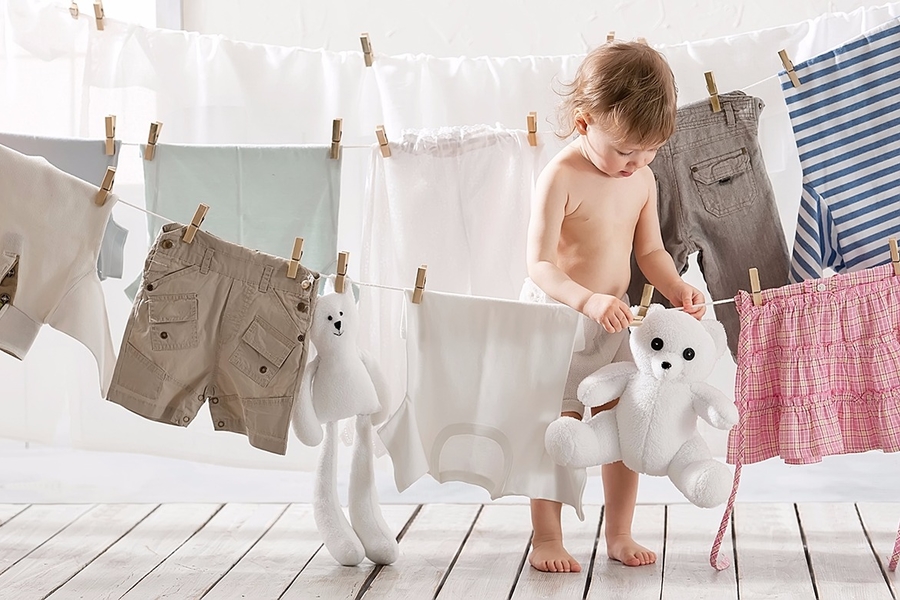
What Should Your Baby’s Laundry Detergent NOT Have?
18 May 2017 | 4 min Read
Preeti Athri
Author | 117 Articles
Powered By:![]()
Your baby might be small, but the mountain of laundry s/he generates is not small at all. As soon as you bring your newborn home from the hospital than you realise that now, laundry is a full-time job. This cycle of – sort, soak, wash, repeat requires plenty of patience and a reliable detergent. Most of us feel that using the same detergent meant for adults mixed with a bit of disinfectant for baby clothes is okay, right? Well, not always.
Why do baby clothes need a special detergent?
A baby’s skin is extremely thin and needs special treatment. That’s why we use soaps, shampoos, creams and lotions meant especially for babies. A conventional detergent usually has a lot of strong chemicals to help get rid of stubborn stains. Most of these detergents leave a residue on the clothes that does not suit an infant’s delicate skin. This residue may cause your baby to develop eczema, boils or rashes. So the next time you go shopping, check for these things that your baby’s detergent must absolutely not have.
1. A strong smell: We know it’s tough to imagine a detergent that does not leave a lingering odour on the clothes. But a strong perfume in your baby’s detergent could alleviate his/her allergies (if s/he has any) or even cause respiratory illnesses. An infant detergent must have a mild, pleasant fragrance that doesn’t hit you over.
2. Phosphates
Phosphates are added to a detergent to make it work more efficiently. However, phosphates could sap your baby’s skin off its moisture and destroy its protective function. An ideal baby detergent must not have phosphates.
3. Fluorescing agents
Fluorescing agents or optical brighteners are chemicals added to certain detergents that ‘whiten’ the appearance of the fabric, making it look cleaner. These chemicals could cause an allergic reaction.
4. Colourants
An ideal infant detergent must be as clear as possible. The dyes and chemicals added to some detergents to give it a distinct colour might not suit your infant’s skin.
5. Harsh bleach
Bleaches are oxidising or reducing agents that help remove stains and disinfect a surface. Bleaches may be chlorine-based or oxygen-based. Chlorine bleaches are harsh and might irritate your baby’s skin. Oxidising bleaches on the other hand (like hydrogen peroxide) are milder, yet effective.
6. Excess foam
You can only check this one once you buy a detergent. A mild detergent must not generate too much foam or lather. This means the detergent has too many surfactants, which could remain on your baby’s clothes and irritate her/his skin.
Till when do I use baby laundry detergent on my little one’s clothes?
As your baby grows, her/his skin develops a better ability to protect itself against irritants and germs. So once s/he’s older, (say when s/he’s a year old) you can use your laundry detergent to wash her/his clothes as well. But if your baby’s skin is extremely sensitive, prone to allergies or if your family has a history of skin allergies,you can choose to continue using a baby detergent. Infact, few parents choose to wash their own clothes in the baby’s laundry detergent as well, especially if the baby is a newborn.
A few other things to look out for when buying a baby laundry detergent:
- Preferably choose a liquid detergent over powder. Powders tend to leave more residue. If you choose a powder, make sure the ingredients are extremely mild or natural.
- Check if the detergent is lab-tested or dermatologically tested to suit a baby’s skin.
- Check the label thoroughly for allergenic ingredients. Ingredients must be simple and hypoallergenic.
xplore the entire collection of articles: Toddler’s Health
If you are reading this article on our website and have an Android phone, please download our APP here for a more personalised experience based on your lifestage.
A


Suggestions offered by doctors on BabyChakra are of advisory nature i.e., for educational and informational purposes only. Content posted on, created for, or compiled by BabyChakra is not intended or designed to replace your doctor's independent judgment about any symptom, condition, or the appropriateness or risks of a procedure or treatment for a given person.
